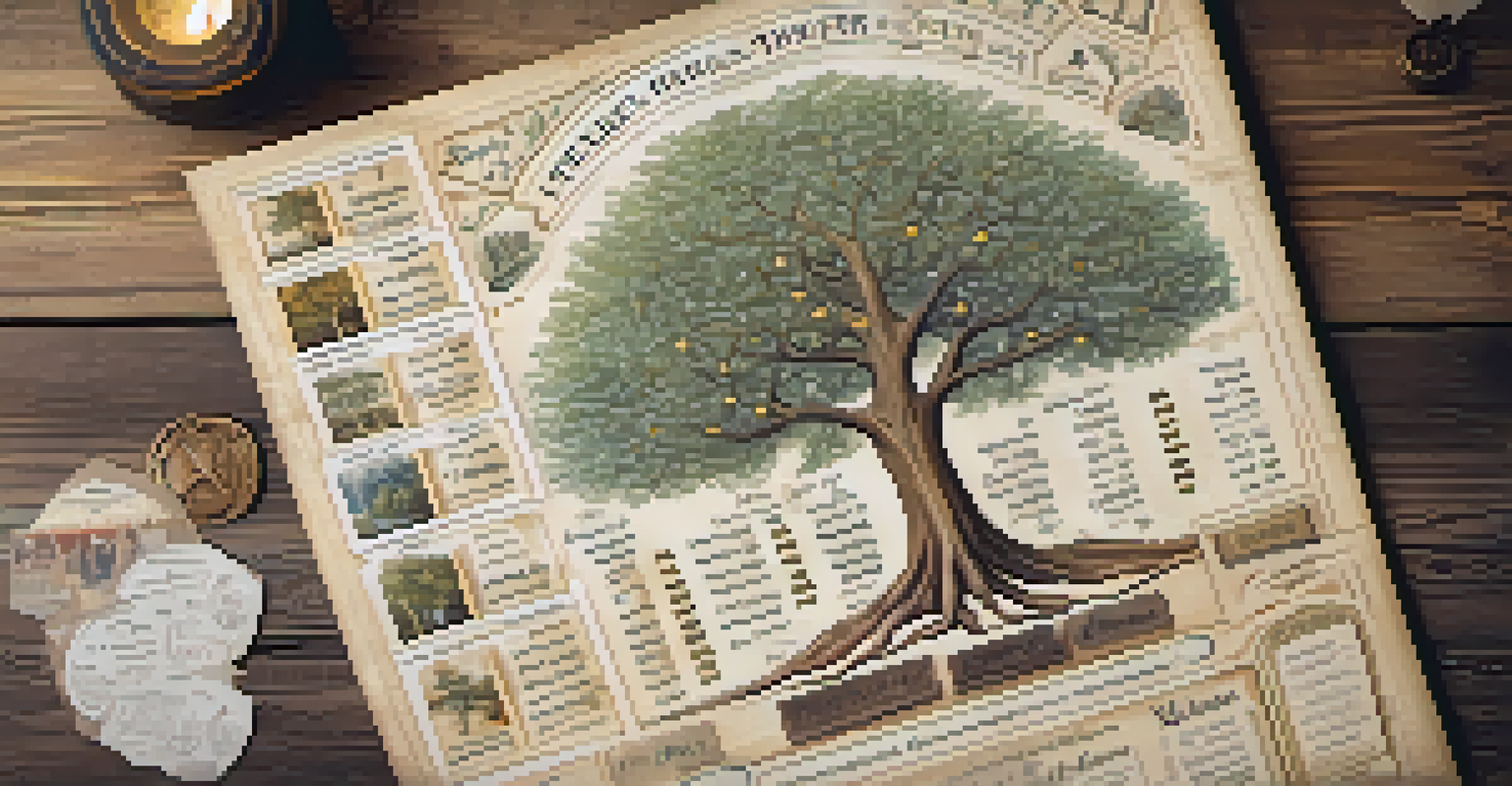Genealogy Myths and Misconceptions: Debunking Common Beliefs

Myth: Everyone Can Trace Their Ancestry Easily
Many people believe that tracing their ancestry is a straightforward task. While tools and databases have made it easier, the reality is often a bit more complex. Depending on your family’s history, you may face challenges such as missing records or common surnames that make it hard to pinpoint your lineage.
Genealogy is about being part of a story that is much bigger than yourself.
For instance, if your ancestors immigrated from a country with scarce documentation, you might hit a dead end. It’s like trying to find a needle in a haystack—challenging but not impossible. Patience and persistence are key assets in genealogy research.
Additionally, the availability of records varies widely by location and time period. Some areas may have well-kept archives, while others might have lost significant historical documents due to wars or natural disasters.
Myth: DNA Testing Reveals Your Complete Ancestry
A common belief is that a DNA test can provide an exhaustive overview of your ancestry. While DNA testing can offer insights into your ethnic background and potential relatives, it doesn’t tell the whole story. Think of it as a puzzle—DNA pieces represent only a part of your ancestry.

For example, your DNA might show that you have Irish heritage, but it won't explain the cultural or historical factors behind that lineage. Moreover, not all ancestry is represented in DNA, especially if certain branches of your family tree are undocumented.
Ancestry Research Can Be Complex
Tracing your family history involves navigating challenges like missing records and common surnames.
It's also important to remember that different companies may provide varying results based on their databases. This can lead to confusion and misconceptions about your true heritage.
Myth: All Family Trees Are Completely Accurate
Many assume that family trees are definitive and accurate representations of lineage. In reality, family trees can be filled with errors, intentional or otherwise. Just like a game of telephone, information can get distorted as it's passed down through generations.
The past is never dead. It's not even past.
For example, someone may have mistakenly recorded a great-grandfather's name or birth date, leading to inaccuracies. This is why it’s crucial to cross-reference information with reliable sources and documents.
Furthermore, some family trees are built on unverified information gathered from online sources. Always take the time to validate facts before accepting them as truth, as this can save you from future surprises.
Myth: Genealogy Is Only for the Wealthy
A prevalent misconception is that genealogy research is an expensive hobby, only accessible to the wealthy. While some resources, like professional genealogists or certain subscription services, can cost money, there are countless free tools available. Libraries, local archives, and online databases offer a wealth of information without breaking the bank.
For instance, websites like FamilySearch provide free access to a vast collection of records. Many communities also host genealogy groups where enthusiasts can share tips and resources, making it a more inclusive pastime.
Genealogy Is More Than Names
True genealogy focuses on understanding the stories and contexts of your ancestors, not just collecting names and dates.
You don’t need a hefty budget to uncover your family history; creativity and resourcefulness can go a long way in this journey.
Myth: All Ancestors Are Well-Documented
Many people assume that all ancestors have thorough documentation available for research. This belief can lead to frustration when encountering gaps in records. The truth is, historical documentation varies significantly based on time, place, and socio-economic status.
For example, while you may find comprehensive records for wealthy families, those of lower-income backgrounds may not have been documented as meticulously. This disparity can impact your ability to trace certain branches of your family tree.
In such cases, creative problem-solving comes into play. Exploring oral histories, local histories, and even social media groups can help fill in those gaps and create a more complete picture of your ancestry.
Myth: Genealogy is Just About Names and Dates
Some believe that genealogy research is merely about collecting names and dates. While those details are important, true genealogy delves deeper into understanding the lives and contexts of your ancestors. It's about uncovering stories, experiences, and the historical events that shaped their lives.
For instance, discovering why your ancestors immigrated or what challenges they faced can add depth to your family narrative. It transforms a list of names into a rich tapestry of history that connects you to your lineage.
Combine Online and Offline Research
Utilizing both online tools and offline resources enhances your understanding of family history, revealing insights that may be missed otherwise.
By focusing on the human aspects of genealogy, you can create a more meaningful representation of your family’s past, making it a much more rewarding endeavor.
Myth: Online Research Is All You Need
Some may think that conducting genealogy research online is sufficient for uncovering their roots. While the internet is a fantastic resource, it shouldn’t be the only avenue pursued. Offline resources, such as local archives, historical societies, and even cemeteries, can provide invaluable information that online databases may not offer.
For instance, visiting a local library might reveal old newspapers or city directories that aren’t digitized. These can contain unique insights about your ancestors that you wouldn't find otherwise.

Combining online research with offline exploration can yield a more comprehensive understanding of your family history, enriching your discoveries.